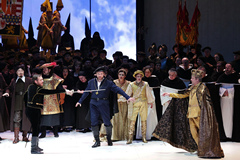| Opera Reviews | 23 April 2024 |
A musically exciting Don Carloby Silvia Luraghi |
|
| Verdi: Don Carlo Teatro alla Scala, Milan 22 January 2017 |
|
|
The opera was performed in its five act version. In the first act, no forest was seen, perhaps on account of the foggy and gloomy appearance of the stage, where displaced people wandered in despair. Interior scenes were mostly empty, with only some hints of the palace walls. In the prison scene the spectators saw the events from outside, while in the second scene of the third act red flames from the stake illuminated the stage, with high stalls to one side and the delegations moving on the opposite side. All singers wore costumes inspired to 17th century Spain. All in all, I found the staging at least functional to the action, and better than other, more gorgeous but sometimes distracting productions. On the musical side, things were more than positive. Maestro Myung-Whun Chung is already at his second opera production since Pereira replaced Lissner as general manager, and led the orchestra with great mastery, highlighting the symphonic side of the score, but certainly not forgetting about the singers. The result was outstanding, also on account of a vocal cast that featured some first class singers. In the title role, tenor Francesco Meli proved once more a reliable interpreter. His ringing tenor nicely melts with the orchestra without ever being covered; he can manage the piani in a very compelling and apparently effortless way, and always gives meaning to the words. King Philip was bass Ferruccio Furlanetto, a master of the score, who sounded authoritative both vocally and theatrically, very compelling in the confrontation with the Grand Inquisitor. The latter was bass Eric Halfvarson, who replaced Orlin Anastassov in the first few performances. His voluminous and aggressive voice matched well Furlanetto’s more refined bass. Baritone Simone Piazzola, who sang the role of Rodrigo, is a stylish singer, technically well equipped, although the volume of his voice could not always equal that of his colleagues. Elisabetta di Valois was Krassimira Stoyanova. After an uncertain start, the soprano gained confidence, and sang with passion and commitment. As Eboli Beatrice Uria-Monzon stepped in at the last moment for Ekaterina Semenchuk, who sang on opening night but then fell ill, and canceled on short notice. The French mezzo might have been unprepared, but her vocal assets sounded quite precarious. The performance was successful, in spite of a somewhat reduced attendance. This may be partly due to the length of the intermissions (almost one and half hours) that added to the natural length of the performance extending it to over five hours.
|
|
| Text ©
Silvia Luraghi Photo © Teatro alla Scala |

 The Peter Stein production of Giuseppe Verdi’s Don Carlo from the Salzburg Festival is one of a series of four productions bought by Alexander Pereira in a controversial move for the Milanese company before even starting his tenure as general manager. Moved from the spacious stage of the Grosses Festspielhaus to the much narrower stage of La Scala, the scenery needed to be reconceived. Resizing was certainly helped by the quite minimalist look of the sets.
The Peter Stein production of Giuseppe Verdi’s Don Carlo from the Salzburg Festival is one of a series of four productions bought by Alexander Pereira in a controversial move for the Milanese company before even starting his tenure as general manager. Moved from the spacious stage of the Grosses Festspielhaus to the much narrower stage of La Scala, the scenery needed to be reconceived. Resizing was certainly helped by the quite minimalist look of the sets. 





